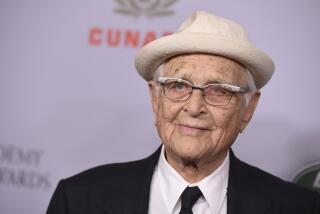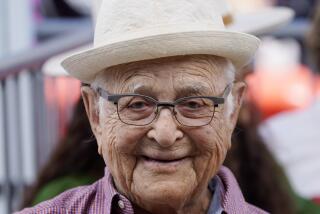Hard questions in a poetic voice
- Share via
So they’ve given up; they’re finally done in and the rat is dead in an alley back of the Wilhemstrasse.
Take a bow GI.
Take a bow little guy.
The superman of tomorrow lies at the feet
of you common men of this afternoon.
This is it kids. This is the day all the way from Newburyport to Vladivostok
You had what it took and you gave it
And each of you has a hunk of rainbow around your helmet.
Seems like free men have done it again.
-- Opening to Norman Corwin’s “On a Note of Triumph” broadcast on V-E Day
*
It’s often said that journalism is history on the run, a rough draft. But when looking back more than six decades at Norman Corwin’s radio broadcast marking the Nazi surrender, it’s clear his stalwart voice and tough, but elegant, prose supplied posterity with a more lasting account.
By standards of the modern media, the hourlong program in May 1945 drew an almost unfathomable audience. In a nation of 140 million, some 60 million listeners tuned in, triggering an instant demand for phonograph records and transcripts of the show, which were hastily pressed and printed.
It was arguably the pinnacle of the medium whose magical hold over its audience would soon be eroded by television. For Corwin, who at 96 still teaches journalism at USC, the work stands out as the brightest star in a career that influenced a generation of journalists, writers and dramatists.
“I wouldn’t say I’m proud because that connotes vainglory,” Corwin said recently from his Los Angeles home. “But I would say it was an effective program.”
A documentary called “On a Note of Triumph: The Golden Age of Norman Corwin,” recounting his momentous V-E Day broadcast, premieres Thursday night on Cinemax. The piece won an Academy Award this year in the short documentary category.
As was his custom when serving as the chair of the documentary awards committee for the Academy of Motion Pictures Arts and Sciences, Corwin did not attend the glittery ceremonies, preferring to watch from his home.
“When you’re there, you get seduced by the atmosphere, the stars and your friends,” he said. “I wanted to see it as the world saw it.”
In the documentary from filmmaker Eric Simonson, which includes interviews with CBS journalist Walter Cronkite, television producer Norman Lear and writer Studs Terkel, Hollywood director Robert Altman discusses the enormous impact of Corwin’s broadcast and goes on to add: “I can recite 40% of ‘On a Note of Triumph’ from memory ... that prayer at the end is something I know like little children know ‘The Lord’s Prayer.’ ”
Corwin’s program consisted of asking and answering of basic questions: Whom did we beat? How much did it cost to beat them? What have we learned out of this war, and is all this going to happen again?
“It was a sober appraisal,” said Corwin, who has been a professor at the USC Annenberg School for Communication for 25 years. “It was not a flag-waving opportunity.”
At the time of the original broadcast, praise for Corwin, who had celebrated his 35th birthday days earlier, was immediate. Billboard magazine described it as “the single greatest -- and we use ‘greatest’ in its full meaning -- radio program we ever heard.” Meanwhile, poet Carl Sandburg called it “a vast announcement, a terrific interrogatory, one of the all-time great American poems.”
But perhaps, had it not been for Simonson, Corwin’s name -- once a household word in American homes -- might have completely faded into the background of history.
Simonson, a company member of Steppenwolf Theatre in Chicago, remembers accidentally coming across Corwin’s broadcast about a decade ago and being struck by two things: “First, the power of his poetry; and second, that I’d never heard of this man before.”
Corwin, dressed in a coat and tie, his thinning white hair neatly combed back, visits with his guest in his living room surrounded by enough books to start a small library. It is not until he attempts to stand or sit that the fragility of his age becomes apparent. He needs assistance to do either, the result of a fall that smashed his hip and pelvis a couple of years ago.
“I haven’t regained my equilibrium since,” he said.
Age has also made his handwriting “quite irregular,” reduced the number of productive working hours in his day, and ruined his sleep.
“There’s a price to pay as you get older,” said Corwin, whose wife, actress Katherine Locke, died in 1995. “The toughest thing, of course, is the loss of loved ones and friends -- the richer the memories, the more poignant the loss.”
Completely intact, however, is his hearty laugh and mind. His voice and speech, peppered with his wit and intellect, are still smooth enough for radio. But mental agility and longevity shouldn’t be too surprising for Corwin given his family history. His older brother is 100 and his father, who used to call him every Monday morning asking him, “Norman, what are you doing?” lived to be 110.
Corwin said he owes the success of his V-E broadcast “to one simple element -- freedom.” By this, he playfully means not only the victory of the Allied soldiers over fascism but also of an artist’s freedom over the interests of commerce.
“When CBS said to me, ‘We’d like to have you do a piece for us on the night of victory in Europe,’ what they didn’t say was, ‘What will be your approach? How much will it cost? Who will you cast? Can we see the first 20 pages?’ ” he recalled. “There was nothing of that. But they were a young network, and they hadn’t learned from older networks how to be crafty and authoritative and stifle the creative impulse. Thanks to freedom, I was able to do what I wanted to do.”
The freedom naturally brought struggle -- how to sum up such a pivotal historical moment? By the end of the war, Corwin remembers feeling like he’d already used every resource he had in his other works. He said he visited museums, the movie houses and walked the streets of New York “growling, kicking automobiles tires,” vainly searching for a handle on the piece.
And then, he said, he picked up his “old friend” Walt Whitman. “I read a poem that he read at the end of the Civil War and he said, ‘Never were such sharp questions asked as at the end of this war.’ And I thought, ‘Jesus, there certainly are sharp questions to ask at the end of this one. And then I knew I had my flight plan.”
More to Read
Only good movies
Get the Indie Focus newsletter, Mark Olsen's weekly guide to the world of cinema.
You may occasionally receive promotional content from the Los Angeles Times.










